MAVERICK CITIZEN
Health crisis: Nelson Mandela Bay sends out SOS as active Covid-19 cases approach 6,000
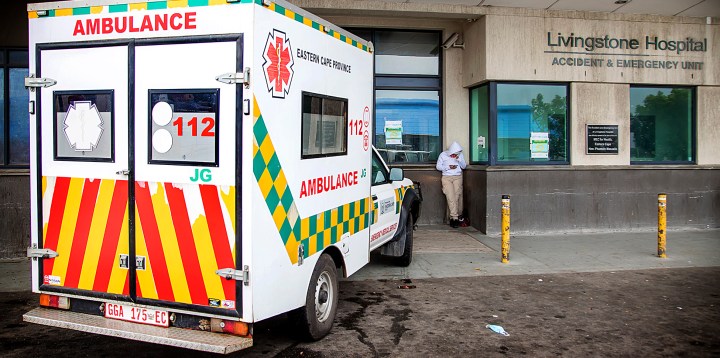
Nelson Mandela Bay leaders on Wednesday 11 November sent out a desperate message: ‘Our city is in deep, deep trouble.’
A new surge in Covid-19 cases is overwhelming Port Elizabeth, Uitenhage and Despatch. The reality is a reduced health workforce buckling under exhaustion, increased deaths, close to 642 patients needing hospitalisation, a slow response from the Eastern Cape Department of Health, three overflowing hospitals and an R11-million state-of-the-art ward lying dormant because there are no nurses to work there.
“The issue of compliance, especially when it comes to social gatherings, is a very big worry to us,” the metro’s acting executive mayor, Thsonono Buyeye, said. “If we don’t change our ways, things will get worse.”
“The city is in serious trouble,” said Shane Brown, chairperson of the metro’s Disaster Management Forum.
“We have increased our total active cases by 840 in a single day. Hospitals are at capacity. There are no beds available. Surgeries have been cancelled. Nurses and doctors are heavily infected and there have been a number of deaths. Health staff are exhausted. They have to pick themselves up. They are doing what they can. This is a competency that we share with the Department of Health.”
Brown said beds in hospitals around the city are empty because there are no nurses and doctors left to assist in these wards.
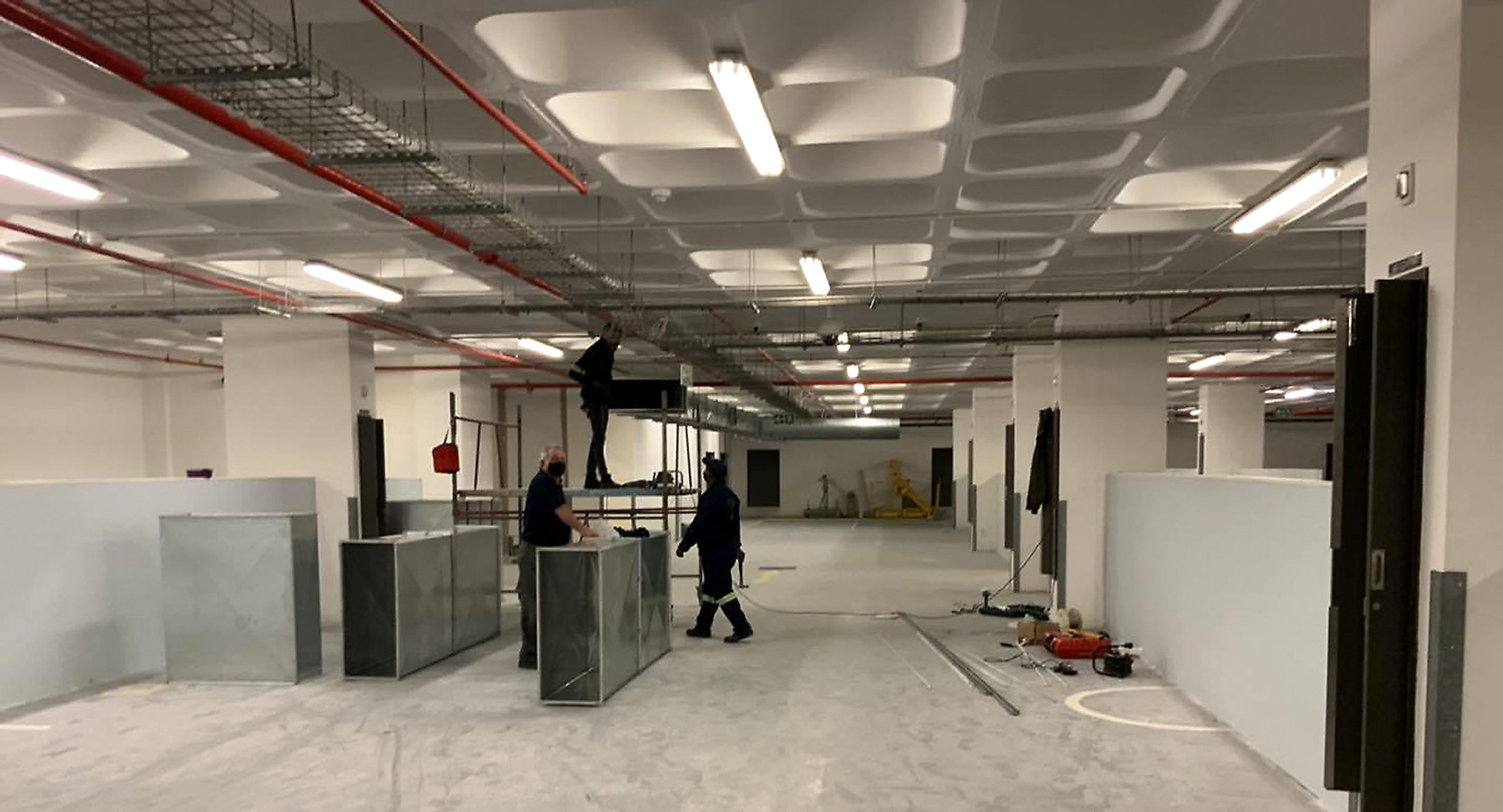
The basement parking at Livingstone Hospital was turned into a Covid-19 ward at a cost of R11 million but cannot be used due to staff shortages. (Photo: Department of Public Works)
It cost R11-million to convert a basement at Port Elizabeth’s Livingstone Hospital into a state-of-the-art ward equipped with 73 beds, including 10 high-care beds capable of supplying oxygen, but it is empty because there are not enough staff to run it.
On Tuesday the physician-on-call unit at the city’s second-biggest facility, Dora Nginza Hospital, turned away patients with breathing difficulties after it became overrun with very sick patients and the facility ran out of oxygen points. There was also no room in the casualty unit for additional oxygen equipment.
With 642 people needing hospitalisation in the metro by Wednesday, private and public hospitals had reached capacity, Brown said. By Wednesday the city had 5,574 active cases of Covid-19.
“Provincially and nationally we are a hotspot for infections,” he said.
Buyeye said that while another hard lockdown is the last thing the metro could afford, the provincial command council had been asked to impose a stricter curfew in Nelson Mandela Bay after many of the infections were traced back to late-night parties and social events.
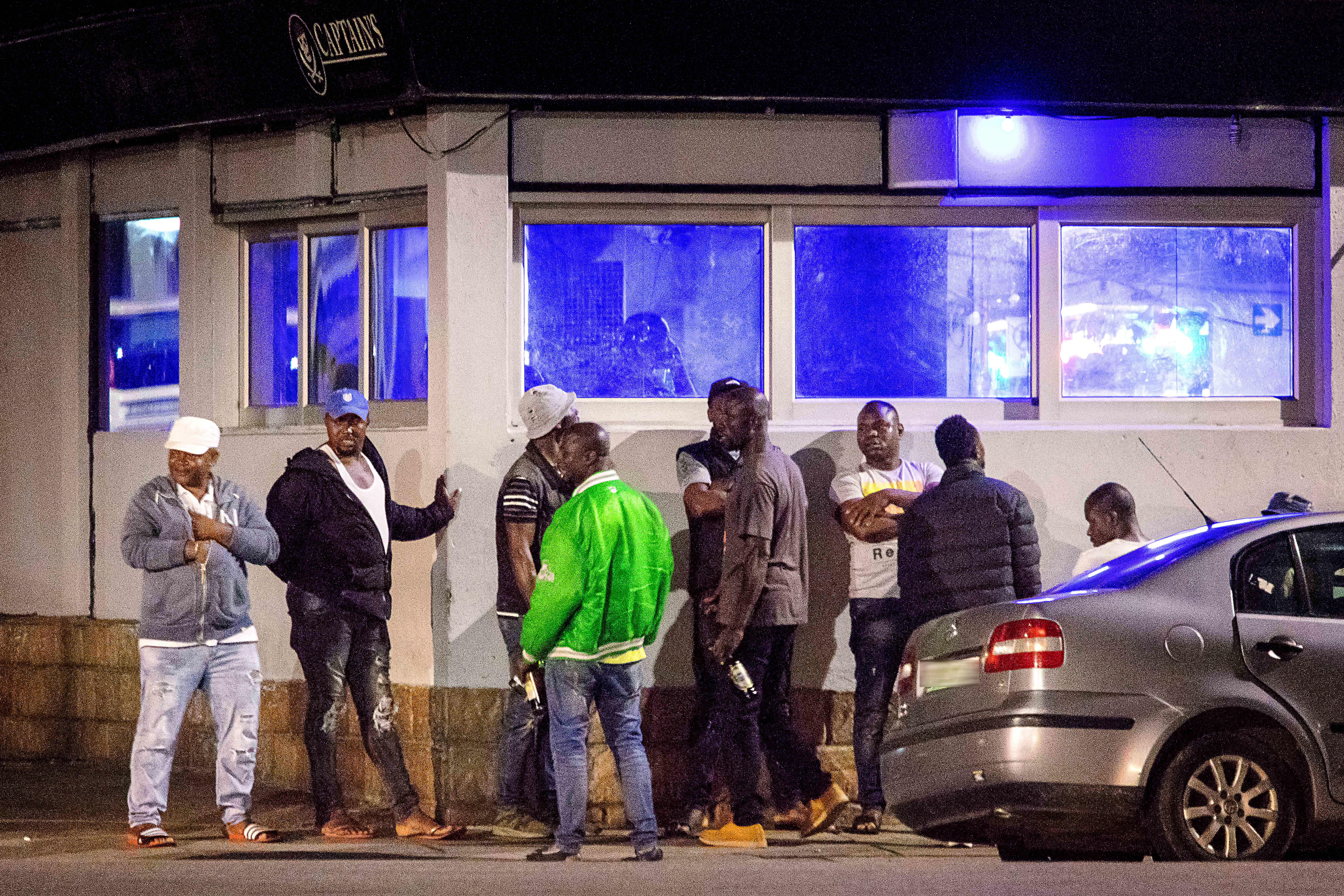
People out drinking in Port Elizabeth’s Walmer Township, an emerging hotspot in the Nelson Mandela Bay area. Picture: Donna van der Watt
“We were unable to accept more patients [at Dora Nginza],” said the Eastern Cape health department communications director, Siyanda Manana. He confirmed that the beds in the repurposed basement at Livingstone Hospital were equipped with oxygen, but that the facility could not be used because of severe staff shortages.
“We are exploring the possibility of reducing bed occupancy [in the rest of the hospital] and then releasing the staff to work in the basement,” Manana said.
“The other option is to contract nurses.”
Doctors said some patients were kept waiting at day hospitals for up to two days before being admitted.
“The hospital is full. We cannot service all the patients for surgery. There are no more intensive care beds available. It is an absolute crisis. The department of medicine is stretched beyond belief,” one doctor said.
All elective surgeries at the hospital have been cancelled until 30 November, at which time the situation will be reviewed.
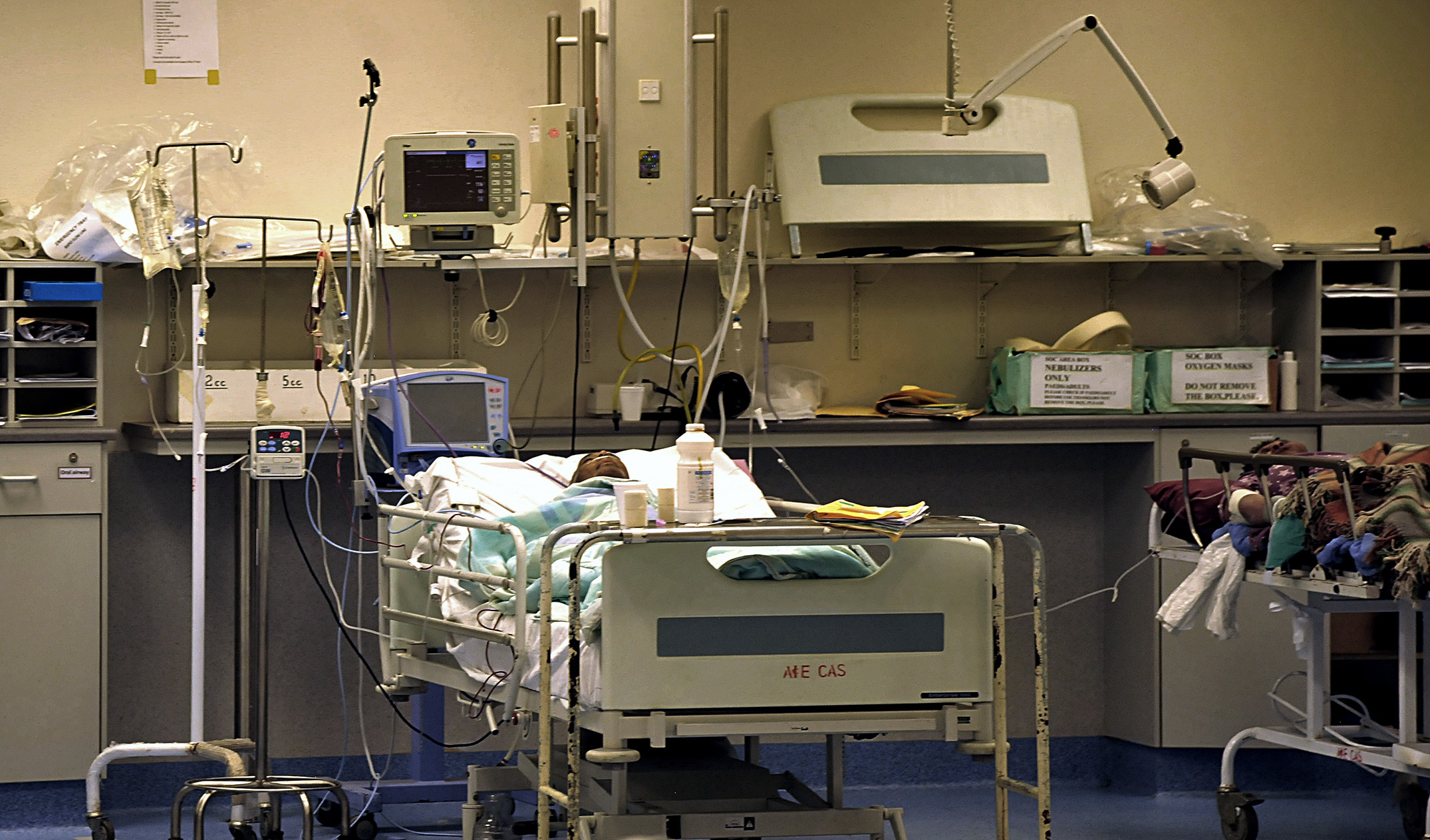
File photo, 3 August 2020: Covid-19 patients in Livingstone Hospital in the Eastern Cape. (Photo: Mike Holmes)
The Livingstone Hospital ICU has been full since Monday. The hospital, which has been earmarked as the main Covid-19 facility for the metro, on Wednesday had 84 patients with Covid-19 and another 21 under observation.
Covid is seriously threatening the city. Municipal departments, police stations and even the police’s call centre had to be shut down because of confirmed Covid-19 cases. We can’t even see the hotspots. This thing is all over the city. Nobody is not affected by it.
Four months ago, the national health department sent a task team to the Eastern Cape to assess the public health system in the Nelson Mandela Bay Metro. They made a number of recommendations, including that the provision of oxygen, equipment, human resources and medicines must improve.
“The support team also found that labour relations is an overwhelming issue that requires a dedicated action plan,” said Mvusi Sicwetsha, the provincial premier’s spokesperson.
“They found that historic arrangements for drainage areas, resource allocation and referral routing are not addressing the significant surge in patient numbers, particularly in under-served, vulnerable populations.”
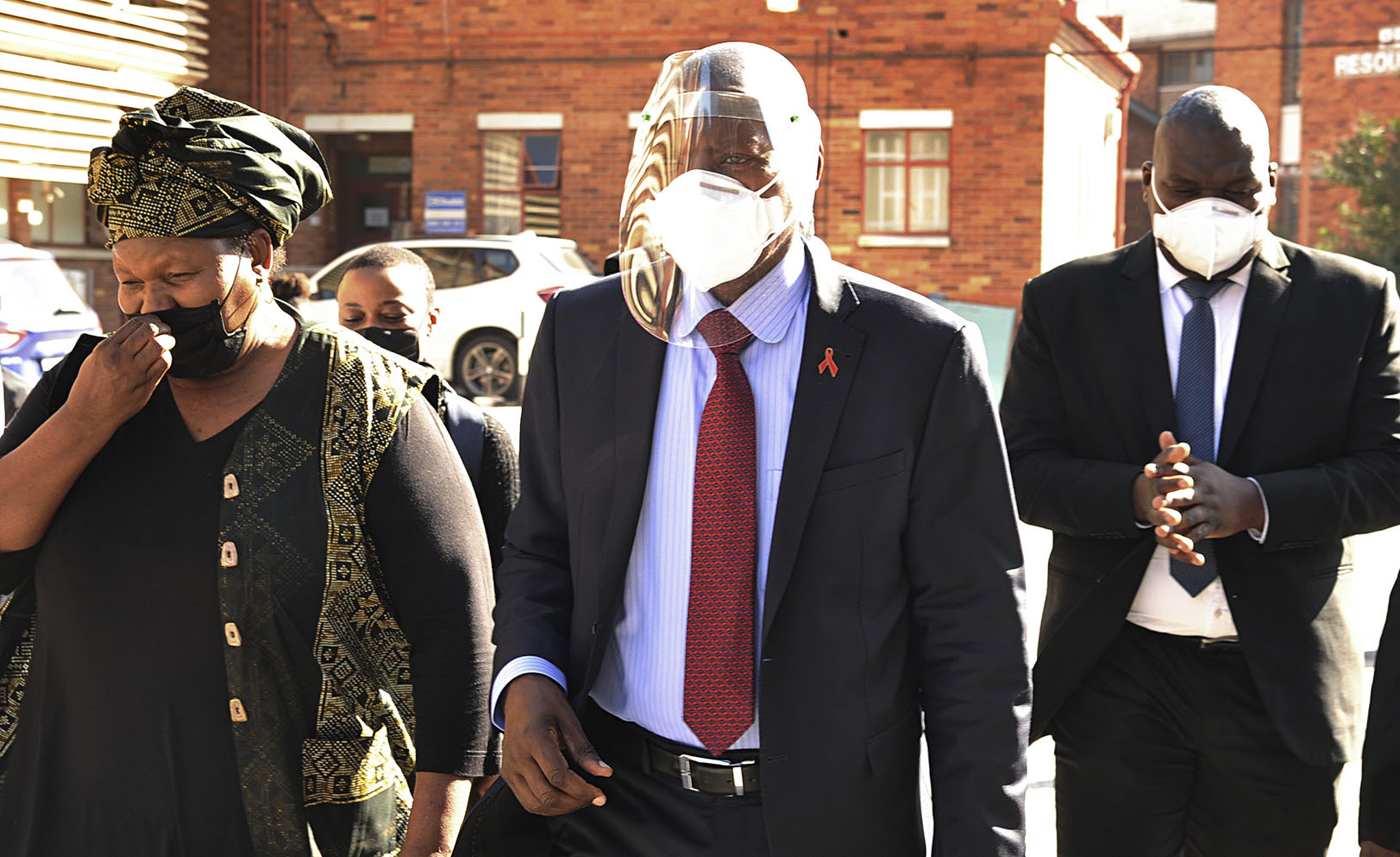
File photo: 28 July 2020: Health MEC Sindiswa Gomba with Minister Zweli Mkhize at Livingstone Hospital. (Photo: Mike Holmes)
A spokesperson for the Eastern Cape Health Crisis Action Coalition, Thoko Mtsholongo, said Livingstone Hospital and the smaller provincial hospital had lost many health workers in the past few months as “they are no longer able to cope with the pressures of the working environment”.
“Doctors and nurses who have resigned, and some who have passed away, have not been replaced. The severe shortage of non-clinical staff persists.
“The temporary workers the department brought into Livingstone Hospital at the height of the first peak [of Covid-19] work to a strict set of hours, which means that doctors and nurses are forced to take up the slack when these workers are no longer on shift.
“The permanently employed porters refuse to work in certain areas out of fear of contracting Covid-19.”
Brown said since March there had been 1,306 Covid-related deaths in the metro. In October there were 47 and recently another 12 were confirmed.
“We identified the nightlife in the city as a major source of infections,” Buyeye added. “There was a recommendation that we should ask for a stricter curfew. We have asked, but the decision is not ours. We are making this request mindful of the fact that there will be consequences.”
He said they had not had a response from the provincial command council.
“We thought we were winning the fight against Covid-19. We took a decision to close down the stadium as a quarantine site. The numbers were dwindling and we could not justify keeping it open.”
“At some point we even considered the issue of [closing down] the field hospital. But now the field hospital has become like gold to us. We are happy that we did not take a decision at the time,” he added.
Buyeye said they will meet with the provincial command council on Thursday and with the “national office”.
“The issue we are discussing is not so much the number of cases but the rate at which the numbers are increasing,” he said.
“There has been a massive increase in nightlife in the city. Law enforcement has been asked to play a greater role. At 10pm to 11pm they are going around to warn facilities to close. The curfew is 12 midnight. You must be home already,” he said.
“Covid is seriously threatening the city. Municipal departments, police stations and even the police’s call centre had to be shut down because of confirmed Covid-19 cases. We can’t even see the hotspots. This thing is all over the city. Nobody is not affected by it.
“We need every resident to know the danger that we are finding ourselves in.”
Brown said 17 cases had been opened against bars, shebeens and “places acting like nightclubs” over the past two weekends. The opening of nightclubs is still banned under disaster regulations.
“Seven places have been shut down for selling liquor, or having functions after midnight,” Brown added. “It is happening on a daily basis.”
He said while the field hospital can accommodate up to 5,000 beds, staff shortages means that they are not able to care for more than 250 to 300 patients at the moment.
“There are urgent requests going out for additional staff from outside of the province by the private sector. The public sector is also looking to find more staff.”
The MEC for Health in the province, Sindiswa Gomba, has not said a word about the current crisis. During a sitting of the health committee at the provincial legislature last week, she accused the senior management of the Eastern Cape Department of Health of making her look incompetent. DM/MC







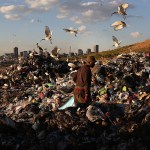










 Become an Insider
Become an Insider
Comments - Please login in order to comment.